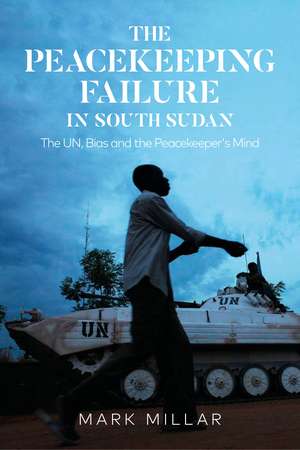The Peacekeeping Failure in South Sudan: The UN, Bias and the Peacekeeper's Mind
Autor Mark Millaren Limba Engleză Paperback – 20 mar 2024
| Toate formatele și edițiile | Preț | Express |
|---|---|---|
| Paperback (1) | 190.96 lei 6-8 săpt. | |
| Bloomsbury Publishing – 20 mar 2024 | 190.96 lei 6-8 săpt. | |
| Hardback (1) | 539.32 lei 6-8 săpt. | |
| Bloomsbury Publishing – 7 sep 2022 | 539.32 lei 6-8 săpt. |
Preț: 190.96 lei
Preț vechi: 249.15 lei
-23% Nou
Puncte Express: 286
Preț estimativ în valută:
36.54€ • 39.68$ • 30.70£
36.54€ • 39.68$ • 30.70£
Carte tipărită la comandă
Livrare economică 22 aprilie-06 mai
Preluare comenzi: 021 569.72.76
Specificații
ISBN-13: 9781350273887
ISBN-10: 1350273880
Pagini: 224
Dimensiuni: 156 x 234 x 25 mm
Greutate: 0.32 kg
Editura: Bloomsbury Publishing
Colecția Zed Books
Locul publicării:London, United Kingdom
ISBN-10: 1350273880
Pagini: 224
Dimensiuni: 156 x 234 x 25 mm
Greutate: 0.32 kg
Editura: Bloomsbury Publishing
Colecția Zed Books
Locul publicării:London, United Kingdom
Caracteristici
As the UN struggles to contain counter skepticism of the value of multilateral action, this book provides a fresh perspective on how international organizations involved in international peace and security can become fit for the purpose for which they were originally conceived
Notă biografică
Mark Millar is a Conflict Analyst with more than a decade's experience working in peace and security institutions including NATO, the UK Foreign and Commonwealth Office and the UN. This includes working in Afghanistan between 2007 and 2011, in South Sudan between 2014 and 2017, as well as in headquarter roles in New York and Brussels.
Cuprins
Chapter 1 - Surrounded Chapter 2 - Towards a Peacekeeping Mindset Chapter 3 - Hope for a Better FutureChapter 4 - The Capital EruptsChapter 5 - UNMISS under attack Chapter 6 - The Battle for Unity Chapter 7 - UNMISS under attack - again Chapter 8 - Peace Fails Chapter 9 - Change in Tactics: The Battle for Upper Nile Chapter 10 - Conclusion
Recenzii
[An] honest and important book
This book offers a rare glimpse of the inside workings of the UN peacekeeping mission in South Sudan, but perhaps even more importantly, Millar as a practitioner-scholar provides the reader with sharp and useful reflections and recommendations. The book combines an easy flowing prose, nitty-gritty details from extended stays in the field and at United Nations Headquarters in New York and somber reflections on the (in)ability of UN peace operations to execute the tasks they are given when deployed into very challenging circumstances. Drawing on organizational studies and decision theory, Millar also makes a useful contribution to the academic literature on these topics. I would strongly recommend the book to students, scholars and anyone interested in getting an inside view of the organizational life of the UN, and a better understanding of how international bureaucracies work in practice and how they can be improved to serve those in need.
Millar's thought-provoking study offers a pertinent critique of the UN's peacekeeping performance in South Sudan. He convincingly highlights how the personal values, psychological, and cognitive factors of peacekeeping leadership shape their preferred responses - sometimes with disastrous results. This book is essential reading for those trying to understand why peacekeeping may fail.
A rare and raw insider account of the repeated failures of the peacekeeping mission in South Sudan, told from the perspective of someone who both spent time at headquarters and in the field during the height of the country's civil war. Millar paints a stark picture of a UN mission plagued by a culture of risk aversion and conflict avoidance and one that didn't learn from past mistakes, making this an essential yet frustrating read.
Mark Millar has written a clear-eyed and cogent insider account of the failures of the United Nations Mission in South Sudan. How did a billion-dollar mission staffed with intelligent, idealistic employees so calamitously fail the people of South Sudan? The Peacekeeping Failure provides a compelling account.
This book offers a rare glimpse of the inside workings of the UN peacekeeping mission in South Sudan, but perhaps even more importantly, Millar as a practitioner-scholar provides the reader with sharp and useful reflections and recommendations. The book combines an easy flowing prose, nitty-gritty details from extended stays in the field and at United Nations Headquarters in New York and somber reflections on the (in)ability of UN peace operations to execute the tasks they are given when deployed into very challenging circumstances. Drawing on organizational studies and decision theory, Millar also makes a useful contribution to the academic literature on these topics. I would strongly recommend the book to students, scholars and anyone interested in getting an inside view of the organizational life of the UN, and a better understanding of how international bureaucracies work in practice and how they can be improved to serve those in need.
Millar's thought-provoking study offers a pertinent critique of the UN's peacekeeping performance in South Sudan. He convincingly highlights how the personal values, psychological, and cognitive factors of peacekeeping leadership shape their preferred responses - sometimes with disastrous results. This book is essential reading for those trying to understand why peacekeeping may fail.
A rare and raw insider account of the repeated failures of the peacekeeping mission in South Sudan, told from the perspective of someone who both spent time at headquarters and in the field during the height of the country's civil war. Millar paints a stark picture of a UN mission plagued by a culture of risk aversion and conflict avoidance and one that didn't learn from past mistakes, making this an essential yet frustrating read.
Mark Millar has written a clear-eyed and cogent insider account of the failures of the United Nations Mission in South Sudan. How did a billion-dollar mission staffed with intelligent, idealistic employees so calamitously fail the people of South Sudan? The Peacekeeping Failure provides a compelling account.
